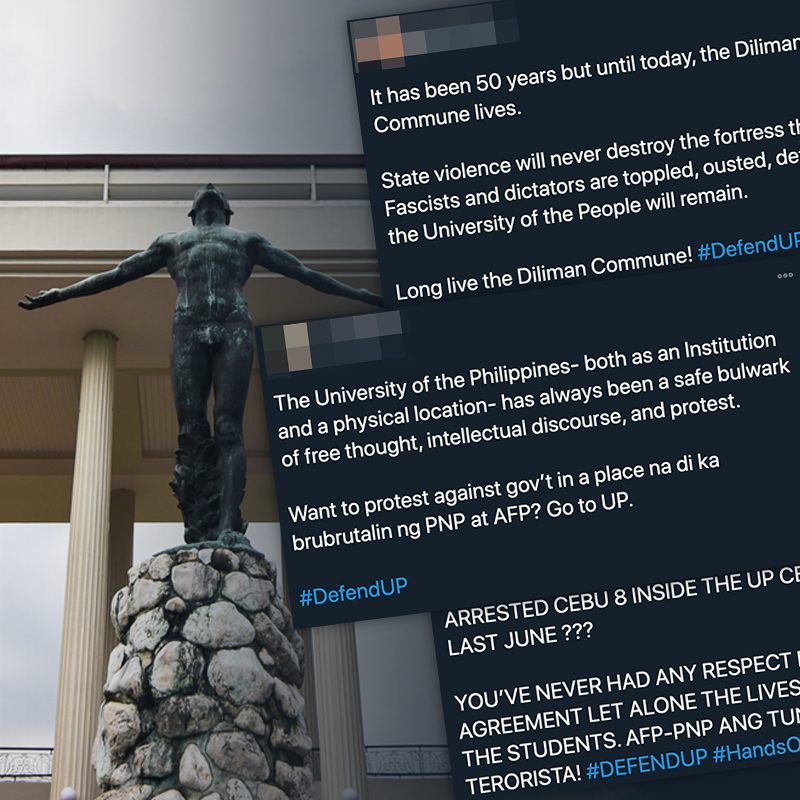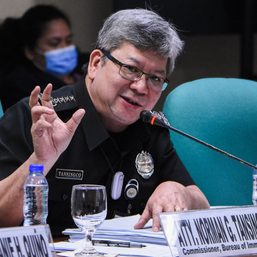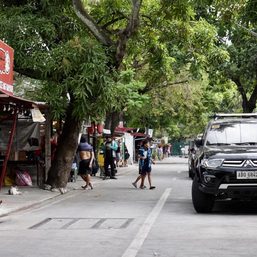SUMMARY
This is AI generated summarization, which may have errors. For context, always refer to the full article.

Filipino youth decried red-tagging and campus militarization after the Department of National Defense (DND) unilaterally terminated the 1989 University of the Philippines (UP)-DND accord on Monday, January 18.
In a letter dated January 15, Defense Secretary Delfin Lorenzana justified the termination by citing the accord as a “hindrance in providing effective security, safety, and welfare of the students, faculty, and employees of UP.”
The 1989 accord prevented state forces from entering UP campuses without permission – a result of a long history of student disappearances, killings, and police and military violence within the vicinity of the campuses.
Its termination would allow the presence of police and military inside campus.
UP, often called the bastion of student activism, had been a frequent target of red-tagging by the government, including President Rodrigo Duterte himself, who had branded the institution as a recruitment ground for the Communist Party of the Philippines-New People’s Army (CPP-NPA).
Lorenzana also cited in the letter “recent events” that “undeniably show” UP students have been identified as members of the CPP-NPA. His claims, however, were not backed by supporting evidence.
Several Iskolars ng Bayan and students took to social media to slam the administration’s red-tagging and continuing crackdown on dissent, with the hashtags #DefendUP, #NoToCampusMilitarization, and #DefendAcademicFreedom trending on Twitter on Monday evening.
Twitter user @sc_madriaga said ending the accord would clear the way for “greater cases” of red-tagging and campus militarization.
Some also reminded the public of the violent dispersal and arrest of the #Cebu8 in an anti-terror law protest in UP Cebu in June 2020, pointing out that state forces had already been violating the accord.
User @YearoftheMonSy emphasized the threats against UP as a safe space for the annual Lakbayan camp-out, when indigenous and minority peoples go to UP to hold a protest against state violence and harassment in their ancestral lands.
“State violence will never destroy the fortress that is UP,” Twitter user @theluciasilva said, citing the historic Diliman Commune, when students put up human barricades to prevent police and military from entering the campus.
Kabataan Representative and UP alumna Sarah Elago stood with UP students in condemning the termination of the accord, which students fought for during a time of rampant abuse by state forces, she pointed out in a tweet.
Senator Francis Pangilinan, a fellow UP alumnus, slammed DND’s move and wrote, “UP has always been and will always be a citadel of freedom and democracy.”
His daughter Kakie Pangilinan also spoke up against the red-tagging of students, which she said proved that the administration was “insecure and threatened” by the youth.
Here’s what others had to say about the termination of the UP-DND accord:
– Rappler.com
Add a comment
How does this make you feel?
![[Time Trowel] Mentorship matters](https://www.rappler.com/tachyon/2024/04/mentorship-matters.jpg?resize=257%2C257&crop_strategy=attention)








There are no comments yet. Add your comment to start the conversation.